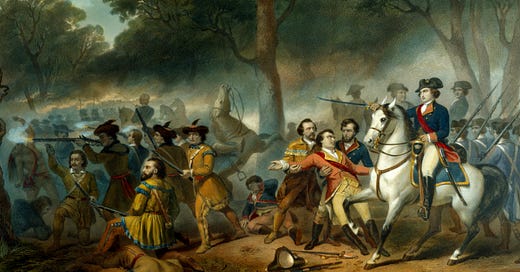There are so many inspiring, beautiful stories about the great heroes of American history which are scarcely ever told. One happens on them accidentally—buried in a thick, out-of-print biography, in small print on a museum sign, casually and fleetingly mentioned in an obscure educational video. America cannot return to greatness in the future if we do not truly understand the greatness of our past. That is why I am writing an article series to tell a few of these little-known but moving or illustrative “untold stories” of American greatness.
Today, Feb. 22, is George Washington’s Birthday. To celebrate, I wanted to share a little-known story of an American Indian chief predicting the younger Washington’s future role as Father of his Country.
Other articles in this series have included John Fitzgerald, Irishman, Revolutionary, and friend of Washington; trailblazing Marines throughout U.S. history; Charity Ferris, unsung heroine of the Battle of Throgs Neck; and Abraham Lincoln’s moving meeting with freed slaves in Richmond, VA. Today I am focusing on an October 1770 meeting between George Washington and his former enemies of the French and Indian War. During that meeting, a Native American Indian sachem or chief told Washington that he must have been protected by God so he could become someday “the chief of nations” and “father of a mighty empire.” Less than five years later, Washington was leading the American Revolutionary Army in their fight against the British that eventually gave birth to the United States.
To understand the story we must first review the Battle of Monongahela. The Battle of Monongahela occurred on July 9, 1755, during the French and Indian War. British Gen. Braddock’s forces were trying to clear the way for other British armies when they were attacked by the French and their Native American Indian allies. After several hours, Braddock himself had been mortally wounded and Braddock’s troops were only saved from total annihilation by a young colonial officer, George Washington.
A stunning 977 of the 1,459 men of Braddock’s expedition were killed or wounded, and Washington himself—at well over six feet and rallying the troops, he was a big target for enemy shots—had two horses shot from under him and multiple bullets through his coat. And yet he was completely unscathed himself. It is a remarkable and miraculous fact that George Washington, though he spent a good deal of his life leading troops into battle, often in very dangerous situations (he was known for not taking care to shield himself), was never wounded in those battles.
George Washington’s personal physician Dr. James Craik related the event of the Indian Prophecy as he personally witnessed it.
“[Mount Vernon] Anxious that other Englishmen would settle on prime real estate near the Kanawha River in Ohio Country, Washington travelled with Dr. Craik and some soldiers in order to make a claim to land promised to them by the British government for serving in the French and Indian War (1754-1763). While in camp in the Kanawha region, they received a group of Native Americans who considered Washington to be the hero-in-defeat at the Battle of Monongahela.
At dinner time, a sachem recalled in great detail to Washington what transpired from his point of view on the day of Braddock’s Defeat fifteen years earlier. The records do not state the sachem's nation, but he may have been Shawnee, Mingo, or Delaware. Since the sachem and his fellow warriors were allied with the French, they had intended to kill Washington, who took over command of the British army’s attempt to retreat after Braddock was injured. Multiple shots were fired directly at Washington, but none touched him. Washington recalled to his mother Mary Ball Washington a few days after the battle that ‘I luckily escap'd with't a wound, tho' I had four Bullets through my Coat, and two Horses shot under me.’ Convinced that the Great Spirit had preserved Washington, the chief [prophesied] that ‘he will become the chief of nations, and a people yet unborn, will hail him as the father of a mighty empire!’ According to [George Washington Parke] Custis, who related the story in his Recollections and Private Memoirs of Washington, Washington did not let the stirring words inflate his ego.”
According to Newt Gingrich at Amfest in December, the sachem told Washington that he had personally shot at the young colonial officer during the Battle of Monongahela thirteen times. God certainly protected Washington so that he could become the indispensable man in the creation of our great nation.





Thank you for this!
I made this into a document (with the url, and attribution) so I could attach it in an email, and also passed your post on to 5 friends, 3 of whom served.
Since I first read your post, I have acquired 3 books on Washington's life and his faith.
Great writing!